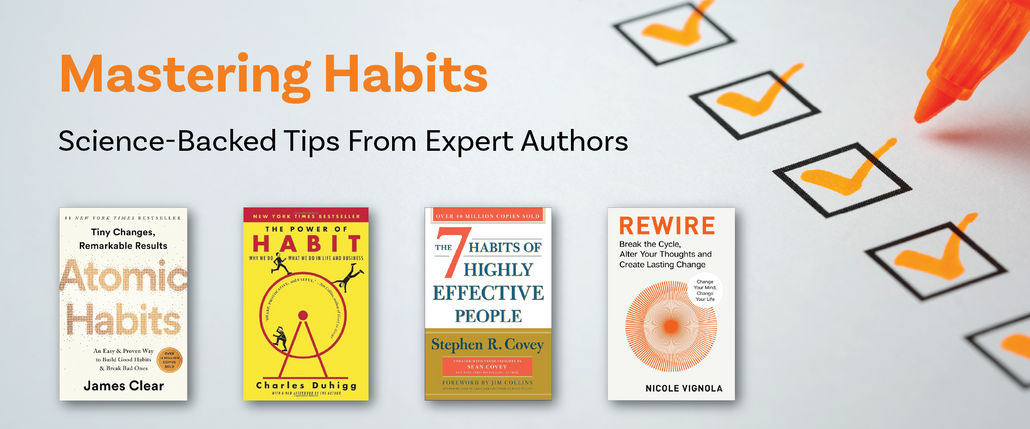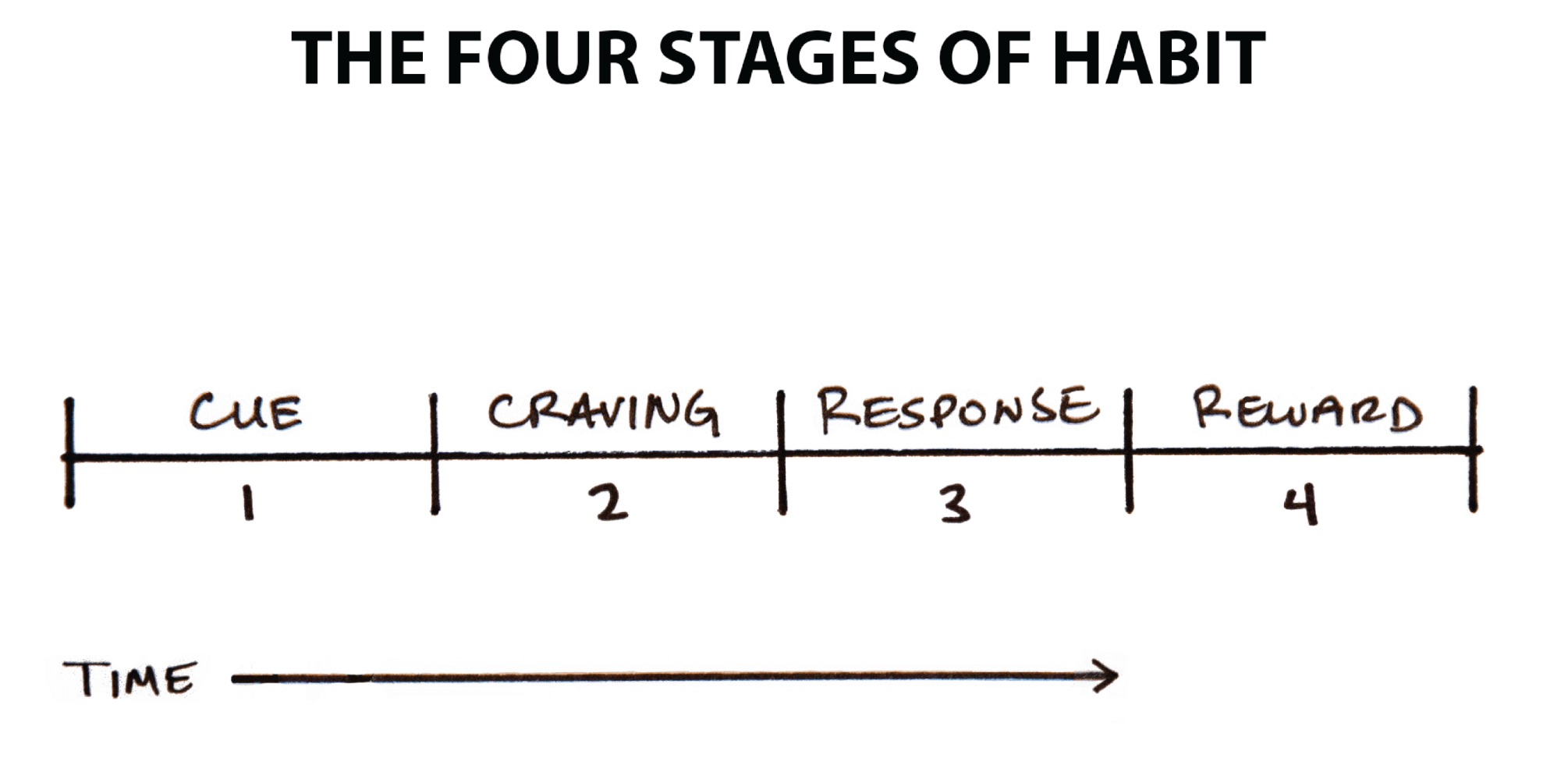
Posted by Sophie Butler on May 23, 2024
Mastering Habits: Science-Backed Tips from Expert Authors
Habits are powerful. They shape our daily lives and define who we are. But have you ever wanted to break an unhealthy habit or learn how to develop a new one? Understanding the science behind habits can help us create those healthy routines and break free from unwanted ones.
Atomic Habits by James Clear has captivated readers worldwide, securing its place as a New York Times bestseller for 233 weeks running. Its enduring popularity and advice has shown the growing interest in the science of habit formation and personal development. In recent years, the topic of creating healthy habits has become a major trend. With tons of experts on the topic, we wanted to share some common questions regarding the science of habits. Get ready to hear from experts in the topic and find ways to create and maintain positive change in you and your organization.
What is a habit?
A habit is a routine or behavior that is performed regularly- and, in many cases, automatically. They are connected to the brain and are powerful because they create neurological cravings. When a habit is formed, your brain stops fully participating in decision-making, allowing it to conserve energy.
Habits can be both beneficial or unwanted. While some may be able to set you up for success or create a healthy lifestyle/ work environment, it’s important to identify unhealthy habits that need to be changed.
How do you create a habit?
The process of building a habit according to James Clear in Atomic Habits can be divided into 4 simple steps. It starts with a cue that triggers the brain to initiate a behavior. The cue begins because it has already in your brain triggered the process of reaching the reward. Cravings are the second step in the habit loop, and it is the motivational force behind every habit. Next the Response. This is the actual habit you perform. Finally, the response delivers a reward, the end goal to every habit. Rewards always satisfy us and teach us.
Keeping those steps in mind, you are able to create a healthy habit from scratch using the same four steps to develop a new one:
- Make it Obvious (Cue): Set up your space or environment to make the cues for your new habit obvious. If you want to drink more water, make sure you keep a water bottle on your desk so it’s top of mind.
- Make it Attractive (Craving): Pair your new habit with something you enjoy to create the craving response. If you want to exercise more try listening to your favorite podcast while working out.
- Make is Easy (Response): Start with small, manageable steps to not overwhelm yourself. If you want to start reading more, it’s more beneficial to set a goal of just a few pages a day than trying to read a whole book in a week to start.
- Make is Satisfying (Reward): By using immediate rewards to reinforce habits, you will get the immediate satisfaction which will make it easier to stick to. Track your progress and celebrate small wins.

How do you change an existing bad habit?
With more than 40% of our daily actions governed by habits, of course there are some that you want to change. However, you can’t fully extinguish a bad habit, you can only change it into a healthy one. But do not stress because Charles Duhigg in The Power of Habit gives you actionable steps to change an unwanted habit.
The golden rule of changing a habit according to Duhigg is to identify a component of the habit loop mentioned above and change one part of the loop. For example if you want to stop drinking coffee at 5 pm, you must identify first why you are craving coffee at this time. If it’s for a break from work or for an energy boost, try changing it to getting up and stretching or drinking water or juice at this time. You are still giving your body the craving of a break to wake up while not drinking coffee. After you start making this change it’s important to practice repetition so your body gets used to the reward, making the habit loop automatic.
How do you maintain the healthy habit you form?
Maintaining new habits can be tricky. It requires consistency and resilience. Stephen R. Covey in The 7 Habits of Highly Effective People emphasizes how important it is to align your new habits with your long-term goals. Also, aligning with your core values helps with motivation. Here are some strategies Covey shared:
- Commit to a Long-Term Vision: It’s important to understand why the new habit you’re trying to change or build is important to you. Also analyze how it fits into your broader life goals.
- Build a Support System: Surround yourself with people who encourage and support your new habits. They can help keep you motivated during tough times.
- Track Your Progress: Keep a journal or use an app to monitor your progress and stay accountable. This can also bring a sense of accomplishment and help you celebrate the small wins.
- Be Patient and Persistent: Habits take time to form. Be patient with yourself and persistent in your efforts.
How do you handle setbacks?
Setbacks are completely normal when trying to change and rewire a habit. This can either be a result of ourselves like being tired or stressed out. When we feel this way it’s easy to fall into old rhythms. However, it’s also common to have external setbacks. So how do you prepare yourself for these setbacks that can come up, especially when it’s not avoidable?
Nicole Vignola in Rewire shows that we can shift how we perceive these setbacks before they even happen. By changing your mindset to see them in a more positive light and less of a detriment to our progress, you can keep the motivation to bounce back. This also plays into self trust. By keeping track of your small wins and progress, you over time will realize you can trust yourself, which gives confidence. This then means when setbacks come up you can still be grounded in that confidence in yourself and your goals you set.
Build better habits with your teams:
Habits are the building blocks of our daily lives, influencing our health, productivity, and happiness. By understanding the science and implementing strategies from experts you can effectively create positive change and break free from negative patterns. If you want to buy any of the books listed in this blog in bulk to help your organization develop healthy habits be sure to check out:
- Atomic Habits by James Clear
- The Power of Habit by Charles Duhigg
- The 7 Habits of Highly Effective People by Stephen R. Covey
- Rewire by Nicole Vignola
Remember, small, consistent actions lead to significant, lasting improvements. Start today by identifying one small habit you want to change, and BookPal is here to help you take the first step towards a better you!



